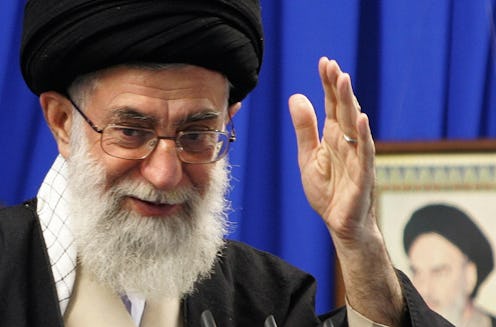News
Is Iran Getting Cold Feet On The Nuclear Deal?
After immediate relief (and some angst) following the signing of a preliminary nuclear deal framework last week, Iran’s Supreme Leader has thrown a spanner in the works. On Thursday, Ayatollah Ali Khamenei said a final nuclear deal was not guaranteed. The statement came after President Hassan Rouhani stipulated that Iran would not sign a final deal unless sanctions are lifted on the day of implementation. The pace at which sanctions will be lifted has been a sticking point in the talks, and is an outstanding issue that will need to be agreed upon in the next three months of negotiations.
“We will not sign any agreements unless on the first day of the implementation of the deal all economic sanctions are totally lifted on the same day,” Rouhani said Thursday, according to Agence France-Presse, a week after the historic deal was reached in Lausanne, Switzerland. Iran and a coalition of six world powers (United States, China, Germany, France, Britain and Russia) agreed on an initial framework, with a final deal slated to be reached by the end of June. The deal seeks to curb Iran’s nuclear program in exchange for a lifting of sanctions.
The timeline of the rollback of sanctions has been a point of contention. Western governments, who have piled further sanctions on top of those stipulated by the United Nations, are pushing for a gradual process. Last week, U.S. Secretary of State John Kerry said: “In return for Iran’s future cooperation, we and our international partners will provide relief in phases from the sanctions that have impacted Iran’s economy.”
But in his comments on Thursday (which also happened to be Iran’s National Nuclear Technology Day), Rouhani made clear that this would not fly with him. And he’s not alone. In his first public statements on last week’s deal, Ayatollah Khamenei said Thursday that he neither supports nor opposes the current framework, but will wait to judge the final deal. But he also emphasized that there "is no binding" agreement yet, adding, in a trademark rhetorical flourish, “Everything is in the details; it may be that the deceptive other side wants to restrict us in the details.”
Almost immediately after the framework was signed, gaps began to emerge between the two sides characterization of the deal. On Saturday, just two days after the deal was agreed, the New York Times reported “some noteworthy differences” between the U.S. and Iranian accounts. A “fact sheet” on the deal issued by the U.S. government was denounced as “spin” by Iranian foreign minister Javad Zarif, who claimed that the fact sheet contradicted the deal agreed to in Lausanne.
David Albright, a well-informed U.S. observer of the Iran talks told the Times that Rouhani and Zarif’s comments might simply be a means of concealing the significance of the concessions Iran made to reach the deal, in order not to anger the Iranian public and hardline conservatives. Which is a fair enough concern, considering that on Wednesday the Tehran Times (a voice-piece for the Islamic Revolution) published an article entitled “Six terrible things U.S. and its allies did to Iran.”
President Obama has his own hands full with conservatives unimpressed by the deal, and both leaders have been urging these hardline contingents to back the framework and work towards a final deal. But the most recent Iranian comments reveal a significant difference in opinion from the six powers — a point of contention that will have to be ironed out before any deal can be finalized.
“It has never been our position that all of the sanctions against Iran should be removed from day one,” White House spokesman Josh Earnest told reporters on Monday. And the State Department has highlighted that if Iran fails to abide by the terms, full sanctions will “snap back into place” immediately. Plenty of work to be done before June 30, it seems.
Images: Getty Images (3)
